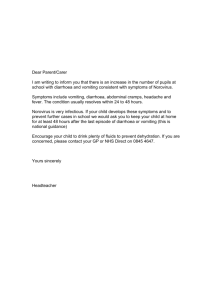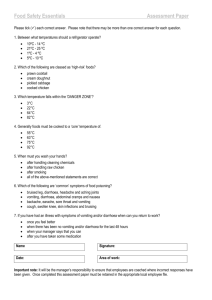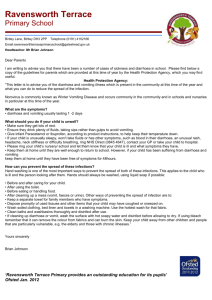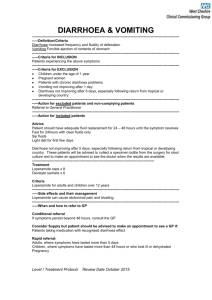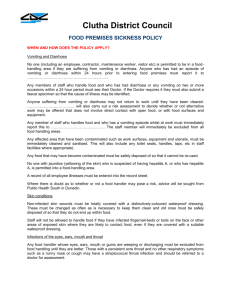action - food handlers - Durham University Community
advertisement
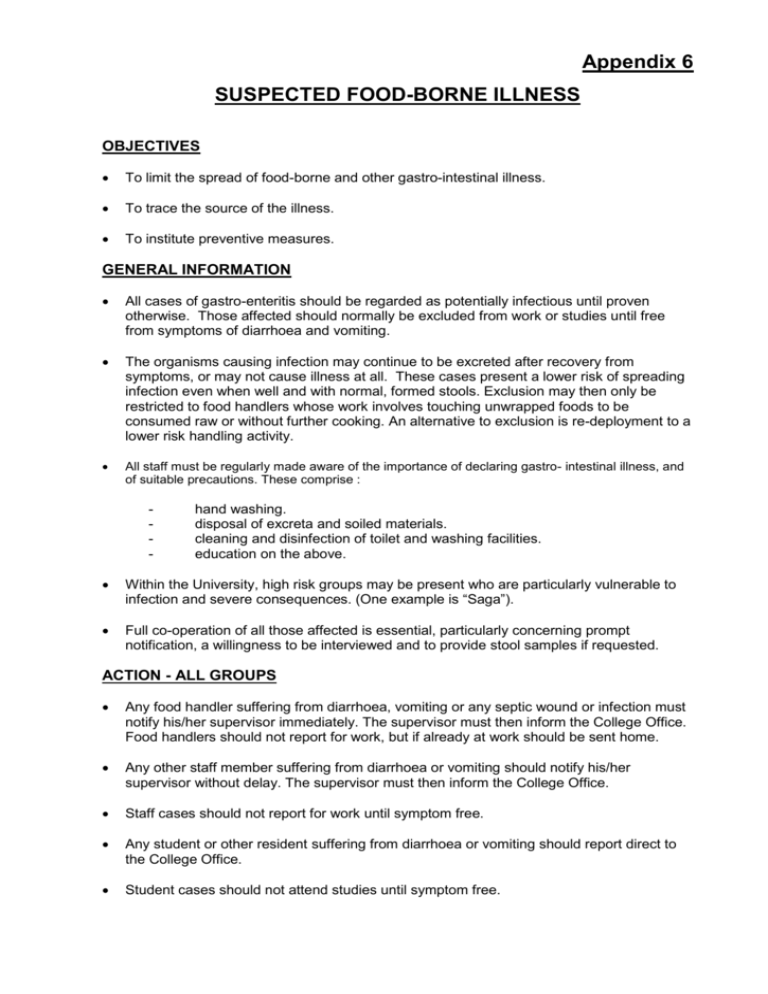
Appendix 6 SUSPECTED FOOD-BORNE ILLNESS OBJECTIVES To limit the spread of food-borne and other gastro-intestinal illness. To trace the source of the illness. To institute preventive measures. GENERAL INFORMATION All cases of gastro-enteritis should be regarded as potentially infectious until proven otherwise. Those affected should normally be excluded from work or studies until free from symptoms of diarrhoea and vomiting. The organisms causing infection may continue to be excreted after recovery from symptoms, or may not cause illness at all. These cases present a lower risk of spreading infection even when well and with normal, formed stools. Exclusion may then only be restricted to food handlers whose work involves touching unwrapped foods to be consumed raw or without further cooking. An alternative to exclusion is re-deployment to a lower risk handling activity. All staff must be regularly made aware of the importance of declaring gastro- intestinal illness, and of suitable precautions. These comprise : - hand washing. disposal of excreta and soiled materials. cleaning and disinfection of toilet and washing facilities. education on the above. Within the University, high risk groups may be present who are particularly vulnerable to infection and severe consequences. (One example is “Saga”). Full co-operation of all those affected is essential, particularly concerning prompt notification, a willingness to be interviewed and to provide stool samples if requested. ACTION - ALL GROUPS Any food handler suffering from diarrhoea, vomiting or any septic wound or infection must notify his/her supervisor immediately. The supervisor must then inform the College Office. Food handlers should not report for work, but if already at work should be sent home. Any other staff member suffering from diarrhoea or vomiting should notify his/her supervisor without delay. The supervisor must then inform the College Office. Staff cases should not report for work until symptom free. Any student or other resident suffering from diarrhoea or vomiting should report direct to the College Office. Student cases should not attend studies until symptom free. Other residents should be requested to give as much information as possible to the College Office, including home address and telephone number. The Health and Safety Office must be notified of the case by telephone, giving as much detail as possible (see ADDITIONAL NOTES). A Suspected Food Poisoning Investigation form will be completed, if necessary (see Appendix 13.8). Where necessary, details will be notified from the Health and Safety Office to the University Health Centre, Durham City Council Environmental Health Department and the County Durham Health Authority Consultant for Communicable Disease Control (CCDC). Where necessary, an investigation will be undertaken by the Health and Safety Office, in co-operation with the University Health Centre, Durham City Council Environmental Health Department and the CCDC. ACTION - FOOD HANDLERS Cases involving diarrhoea may be required to submit a stool specimen for microbiological testing. This should be via the Health and Safety Office, University Health Centre or a patient’s own GP surgery. The necessary sample pots and forms are available from the Health and Safety Office or the University Health Centre. Criteria for a return to work will be determined by individual case circumstances, although subject to a satisfactory test result from any stool specimens taken the majority should be safe to recommence duties after being free of diarrhoea and/or vomiting for a period of 48 hours. In the case of a septic lesion, this should have been treated and be healed. Clearance must be obtained from the Health and Safety Office - following consultation with the of work where they pose little or no risk of transmitting infection. A organisations detailed above - but it may be necessary to temporarily re-deploy staff areas Review Health Questionnaire must be completed by the food handler, immediately on return to work. This is to be kept in the individual's file. Any further action required will be determined by the Health and Safety Office, University Health Centre or CCDC. ADDITIONAL NOTES Cases of gastro-enteritis often arise at night and weekends, when the Health and Safety Office is unoccupied. At such times, the University Health Centre should be contacted for advice, using the emergency number 386 5081. Out of hours in the event of no person being available to give advice at the above locations, there is a 24-hour duty rota of Consultants in Public Health Medicine, provided by the Health Authority to cover emergencies concerning infectious diseases and food poisoning. This is held by the Dryburn Hospital switchboard. (Tel. 3332333). Alternatively, the Consultant for Communicable Disease Control (CCDC), can be contacted directly on 3333271, or his secretary on 3333372. Copies of the following summary information should be displayed within the College Office and catering department. (Reviewed - 15 May 2001) University of Durham GASTRO-ENTERITIS IN A COLLEGE OR SOCIETY ACTION TO BE TAKEN ALL cases of sickness and diarrhoea must be reported to the College Office. This applies to staff (particularly food handlers), students and other residents. Food handlers must also report septic wounds or infections such as infected cuts, sore throats and discharging ears. Staff and students should not report for work or attend studies until well. Details of all cases must be notified by the supervisor or College Office to the Health and Safety Office on extension 2706 or 2705. If appropriate advice is not available, the University Health Centre should be contacted on 386 5081 OR . . . Durham County Health Authority Consultant in Public Health Medicine on 3332333 (24 hour availability). This action is additional to that normally adopted in the event of cases or outbreaks of other illnesses.
